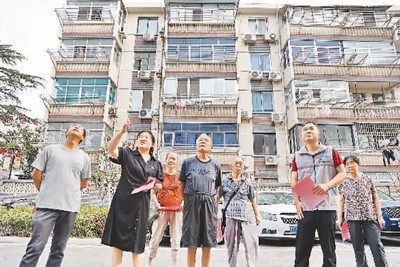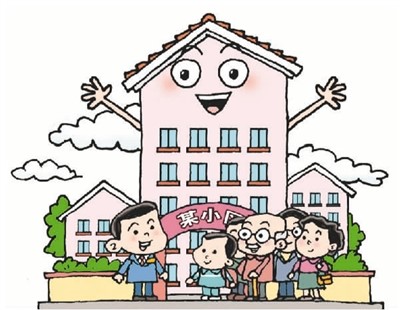"Small community" writes "big article" on social governance

Luyuan New Village, Qufu City, Shandong Province integrates socialist core values and excellent traditional culture into grassroots social governance. The picture shows the villagers experiencing traditional culture in the demonstration street.
Photo by Yang Guoqing (People’s Vision)

Yijiaqiao Community, Chongchuan District, Nantong City, Jiangsu Province, invited deputies to the District People’s Congress and members of the District Political Consultative Conference to discuss high-altitude parabolic control through the "something to discuss" consultation room.
Photo by Xu Congjun (People’s Vision)

Xinhua news agency
Urban and rural communities are the basic units of social governance. With the transformation of social governance structure, grass-roots society has increasingly become the intersection of various interests, and the focus of social governance has been shifting to grass-roots communities. Since the 18th National Congress of the Communist Party of China, the CPC Central Committee and the State Council have successively issued a number of important documents on community public services and community governance. The innovative practice of community governance in various places is in full swing, and the urban and rural communities have taken on a new look.
The Party’s Report to the 20th CPC National Congress proposed to improve the social governance system. Improve the social governance system of co-construction, co-governance and sharing, and improve the efficiency of social governance. Smooth and standardize the channels for the expression of people’s demands, the coordination of interests and the protection of rights and interests, and build a social governance community that everyone is responsible, everyone is responsible, and everyone enjoys it.
How to carry out community governance? How to mobilize the enthusiasm of residents? How to promote the modernization of community governance system and governance capacity? The reporter conducted a visit.
"If you have anything to discuss together, it is difficult to help each other."
"The flowers and plants in the small garden on the south side of the community are neglected, and some of them are abandoned." "Add pavilions and benches in Little Square to transform the old people into a shelter from the wind and rain" … … This is an "Old Neighborhood" Council meeting recently held by Donglibei Community in Laoshan Street, Shijingshan District, Beijing, around the construction of "quality community". At the meeting, the community party committee, the person in charge of the property enterprise and the residents’ representatives had a heated discussion.
"Where to change, residents give advice; How to change it, residents will participate; Whether it is changed well or not, residents will evaluate it. " Zhao Hong, secretary of Donglibei Community, summed up this set of working methods, which originated from an organic renewal and upgrading of the community three years ago.
Donglibei community is a community that has been built for a long time and has many accumulation problems; At the same time, residents are mainly composed of retired employees and their families, and residents are old colleagues, old workers and old neighborhoods. Since it’s an old neighborhood, why not get the residents together? To this end, the community built a platform for residents’ participation based on the "old neighborhood" parliamentary hall to collect opinions and suggestions. Set up a reception desk in the community to solve residents’ questions. After the completion of the project, the community also set up a property management committee to allow residents to participate in community governance together with the community and property companies.
"In the past, our compound gave people the impression that it was old, old and chaotic. After everyone’s efforts, now the corridor has been painted and replaced with a new elevator. The road is flat, the ground lock has been removed, and the neighborhood relationship is more harmonious." Liu Yongbin, a resident of Donglibei Community, and many neighborhoods signed up for the "Old Neighborhood" volunteer service team in the community. He said: "By participating in the volunteer team and the Council, the neighborhoods can discuss everything together and help each other if it is difficult, and the community is warmer."
"Old Neighborhood" Council and "Old Neighborhood" Volunteer Service Team & HELIP; … In Shijingshan District, community governance is inseparable from the "old neighborhood". According to reports, the "old neighborhood" originated from a caring action initiated by volunteers in party member, a special steel community in Bajiao North Road in 2013.
"In recent years, Shijingshan District has taken the opportunity of building a national experimental zone for community governance and service innovation, and built a zone — Street — Third-level Party Building Coordination Committee in the community, innovative deliberation and consultation mechanism, and continuous deepening ‘ Old neighborhood ’ Brand connotation, improve the community governance mechanism of co-construction and co-governance. " Wu Zhipeng, secretary of the Social Work Committee of Shijingshan District Committee and director of the District Civil Affairs Bureau, said that at present, 154 communities in Shijingshan District have set up the "Old Neighborhood" community Council Hall, and 208 "Old Neighborhood" floor committees, with 99,600 volunteers participating in voluntary service all the year round, and the "Old Neighborhood" security team, persuasion team and emergency detachment have achieved full coverage of the community.
After the reform and opening up, with the in-depth development of the socialist market economy, "unit people" have gradually become "community people", and many service and management functions originally undertaken by the government and units have been transferred to the community.
Since the 18th National Congress of the Communist Party of China, the construction of urban and rural communities in China has entered the fast lane. According to Zhan Chengfu, Vice Minister of the Ministry of Civil Affairs, at the press conference on the theme of "Ten Years in China" held in Publicity Department of the Communist Party of China in early September, in the past 10 years, the coverage rate of comprehensive community service facilities in urban and rural areas has increased from 82% to 100%, and that in rural areas has increased from 31.8% to 79.5%. In the prevention and control of epidemic situation in COVID-19, more than 4 million urban and rural community workers throughout the country have made great efforts and dedication in the front line of prevention and control … …
"Since the 18th National Congress of the Communist Party of China, grassroots governance, especially urban and rural community governance, has become the focus of social governance. All localities continue to innovate community governance methods, develop community deliberative democracy, resolve social contradictions and provide social services in the community to the greatest extent, and the people’s sense of acquisition, happiness and security in community life has been continuously improved. " Wang Weijin, director and associate researcher of the Public Administration Research Office of the Institute of Public Administration and Human Resources of the State Council Development Research Center, said.
"Strengthen the guidance of Party building and get through the service for residents ‘ The last mile ’ "
Lao Zhang, a community resident of Xinjia Street in Longkou City, Shandong Province, used to live in the countryside and wanted to open a noodle restaurant after he settled in the city. Seeing the opening of the restaurant, the health license of the noodle restaurant service staff has not been done yet, which can make him anxious. A few days ago, when he returned to the community, he heard the loudspeaker at the door introducing the opening process of food and beverage outlets, and quickly went to the community for consultation. With the help of the "red heart agent" in the community, Lao Zhang quickly sorted out the procedures and prepared the materials, and the noodle restaurant opened smoothly.
Lao Zhang said: "I just arrived in the city and didn’t adapt to life, but there is a big horn like the entrance of a rural village at the door of the community to publicize the convenience policy in time;" There are difficulties, and the community agent helps solve them. Now I live with peace of mind. "
Whether the community governance is good or not depends on the grass-roots party organizations and party member. Since the beginning of this year, Xinjia Street has set up a "Red Heart Agency" team and set up a "Red Heart Agency", with the general party branch secretary of each community as the head of the "Red Heart Agency", and members of the two committees of the community, party member and volunteers as "Red Heart Agents"; An agency system has also been established to transfer the things that residents originally needed to go to the streets or urban areas to the nearest "red heart agency", and provide services such as door-to-door and escort for people in need. "Carry out &lsquo by strengthening the guidance of party building; Loudspeaker ’ ‘ Red heart agent ’ Waiting for micro-services, the streets have opened up services for residents ‘ The last mile ’ 。” Lu Xiaofeng, deputy secretary of the Party Working Committee of Xinjia Street and director of the office, said.
In recent years, village (community) party secretaries and directors have been fully promoted in various places. At present, the proportion of village (community) party secretaries and directors is 95.6% and 93.9% respectively. In some places, the system of community party building alliance and community registration in party member has been actively explored, and the important role of party building in leading community governance has been brought into play in various forms. The social governance system of party committee leadership, government responsibility, democratic consultation, social coordination, public participation, legal protection and scientific and technological support has been continuously improved.
"From the perspective of the main body of grassroots governance, it is no longer a single administrative management, but a systematic governance involving multi-subjects such as party Committee leaders and government responsibilities." Xiang Chunling, a professor at the Teaching and Research Department of Scientific Socialism of the Central Party School (National School of Administration), said that in view of the problems of blurring, weakening and marginalizing the grassroots organizations of some local parties in the past, the CPC Central Committee promoted the comprehensive and strict management of the party to the grassroots level. Through the promulgation of a series of inner-party laws and regulations, we will improve the system of the Party’s overall leadership over grassroots governance, constantly enhance the Party’s political leadership, ideological leadership, mass organization and social appeal, and give play to the role of the Party organization as a fighting fortress in grassroots governance, especially to stimulate party member’s vitality and give play to party member’s vanguard and exemplary role.
"With the participation of all parties, many things will be much easier."
Rest your feet, drink water, prevent getting lost, dare to help, and help the elderly … … In banks, restaurants, community service centers, and even convenience stores and printing shops in Chaoyangmen Street, Dongcheng District, Beijing, you can often see brands that provide these warm-hearted services. Today, nearly 100 merchants and units have joined this "pension circle" called "regional pension service consortium".
As a member of the "Pension Circle", Jiangsu Bank makes the elderly in the community feel kind. Wheelchairs, crutches, reading glasses and other tools that the elderly may use when doing business are placed in the lobby of the bank. Even if they don’t do business, some old people are willing to go in for a drink and rest when they are tired. In addition to holding seminars in the community to identify counterfeit money and prevent financial fraud, banks often carry out special activities for the elderly, such as nutritious meals, Chinese medicine massage, mobile phone teaching, dumplings and dumplings. "Doing a good job in old-age care has put forward new requirements for our service level." Yan Wenya, a staff member of Jiangsu Bank, said.
The proportion of elderly people in Chaoyangmen Street is 26%. How to make the elderly living at home have service guarantee in their lives? Building a regional pension service consortium and mobilizing social resources to participate in serving the elderly have become the starting point for street community governance.
But this process is not easy. Liang Nan, director of Chaoyangmen Street Civic Activity Center, said that many merchants were enthusiastic about participating in the survey, but they all had concerns: it is easy for the elderly to rest and drink water, but what if the elderly have an accident? Who will bear this responsibility?
The problem is sharp, but it is true. After multi-party coordination, the government finally funded the comprehensive liability insurance for the old-age service institutions for the site units of the "consortium", which solved the worries of merchants. Nowadays, the "consortium" has entered the 3.0 stage, and the deep-seated needs of more elderly people are being paid attention to.
Pension, nursery, social assistance, employment and entrepreneurship, medical security … … The needs of community residents are multi-faceted, which requires further improvement of community service awareness and governance efficiency.
"The key to improving the effectiveness of community governance is to improve the level of public participation." Wang Weijin believes that the current predicament of public participation in community governance mainly lies in the lack of awareness or ability, the improvement of relevant systems, the innovation of organizational carriers for convenient public participation, and the integration of property services and community governance.
Wang Weijin suggested paying more attention to community planning and community public space construction, and providing public space such as communication, entertainment, deliberation and service for public participation; Pay attention to the realization form of village (neighborhood) people’s autonomy, and improve the normal and practical mechanism construction for village (neighborhood) people to participate in community governance; Actively develop community-oriented social organizations, promote the integration of residential property management and community governance, and enhance residents’ rational communication and consultation and deliberation ability through the development of grassroots social workstations and community education.
One of the key points to improve the efficiency of social governance is to smooth and standardize the channels for the expression of people’s demands, the coordination of interests and the protection of rights and interests. Xiang Chunling suggested that the first is to improve the legal appeal expression mechanism, give play to the role of people’s congresses, CPPCC, people’s organizations, social organizations, grassroots autonomous organizations and other mass appeal expression channels, and improve the open and transparent appeal expression and handling methods. The second is to improve the interest coordination mechanism, ensure the people’s right to know, participate, make decisions and supervise, and coordinate the interests of all parties through social publicity, public hearings, expert consultation and argumentation. The third is to improve the protection mechanism of the rights and interests of the masses, and safeguard the vital interests of the masses in land acquisition, house demolition, labor relations, education and medical care, and social security through reform and innovation.
For community governance, Liang Nan, who has worked at the grassroots level for nearly 20 years, has his own experience: "The street level must be co-ordinated at a high level and establish a sense of chess. After all, the strength of a department is limited." She believes that grassroots departments should do a good job of coordination and pay attention to giving play to the strength of community workers, volunteers, enterprises and professional social organizations. "Many things will be much easier if all parties participate together, make suggestions and show their abilities." Liang Nan said.